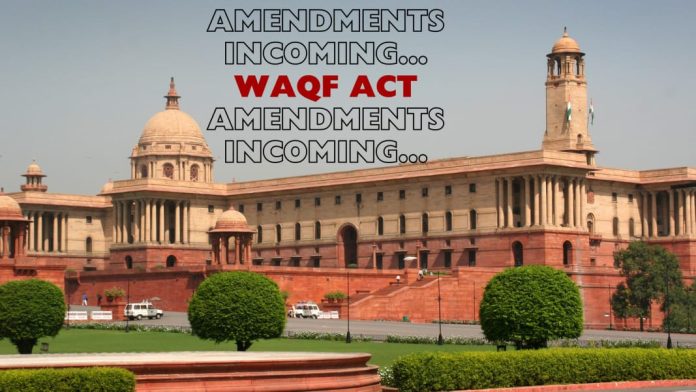4 August 2024: The Centre is preparing to introduce a bill in Parliament aimed at amending the Wakf Act, significantly reducing the powers of Waqf Boards across the nation. This move targets properties claimed as ‘disputed’ by government agencies and certain social organizations allied with political parties.
As per reports in the media, the Union Cabinet approved the proposed legislation on Friday, which encompasses around 40 amendments designed to limit the extensive authority of Waqf Boards, especially regarding the declaration of land as Waqf property. The bill also seeks to repeal certain existing clauses.
Key changes in the draft legislation involve restructuring Waqf boards, revising their composition, and requiring land verification before it is declared Waqf property. The amendments specifically address Sections 9 and 14 of the Wakf Act, altering the composition of the Central Waqf Council and state Waqf boards to ensure women’s representation.
The bill further mandates fresh verification of disputed land claimed by state Waqf boards. This follows a Delhi High Court directive from May last year, permitting the Union government to physically inspect 123 properties claimed by the Delhi Waqf Board. Subsequently, the Union Urban Development Ministry issued notices regarding these properties in August.
The necessity for this bill is underscored by incidents like the Tamil Nadu Waqf Board’s claim in September 2022 over the entire village of Thiruchendurai, which has a predominantly Hindu population. Currently, 30 Waqf boards are operational across 28 states and Union territories in India.
Jamaat-e-Islami Hind Assistant Secretary Inamurrahman Khan, who oversees Waqf issues, noted that discussions about drastic amendments to the waqf board have been ongoing in power corridors for some time. Government agencies have sought to acquire prime waqf properties in Delhi, but existing waqf laws have been an obstacle. The Delhi Development Authority (DDA) has already issued notices to the Delhi Waqf Board and mutawallis (managers) of 123 waqf properties in Delhi, including prominent mosques, mausoleums, and graveyards in Lutyens’ Delhi and Old Delhi.
Initially passed in 1954 and amended in 1995, the Wakf Act was designed to regulate ‘Auqaf’—properties donated and designated as Waqf by a ‘wakif’, or a person dedicating property for pious, religious, or charitable purposes under Muslim law. Further amendments were made in 2013 to address various shortcomings.
Government records indicate there are approximately 8.70 lakh Waqf properties covering 9.40 lakh acres of land. During the previous Modi administration, the Ministry of Minority Affairs reviewed the extensive powers of state Waqf boards, particularly their authority to declare properties as Waqf and appoint Mutawallis (Waqf managers).
The introduction of this bill coincides with upcoming assembly elections in Haryana, Maharashtra, and Jharkhand in October this year.




